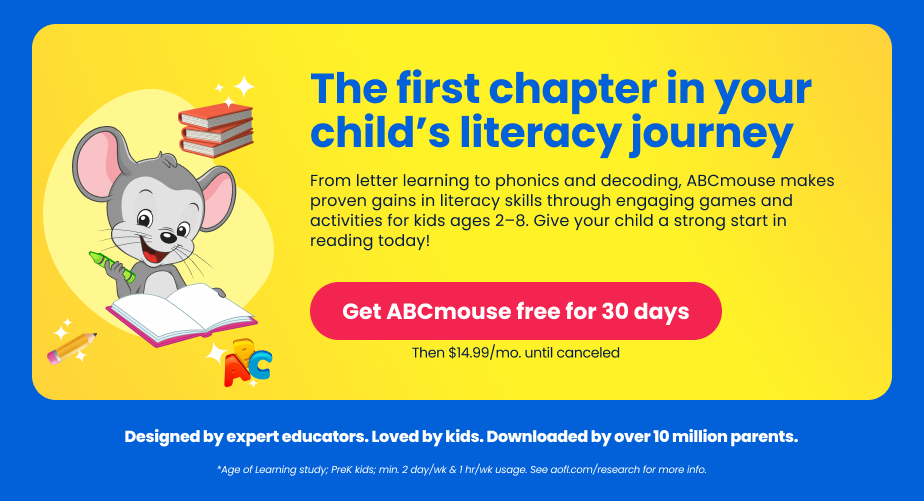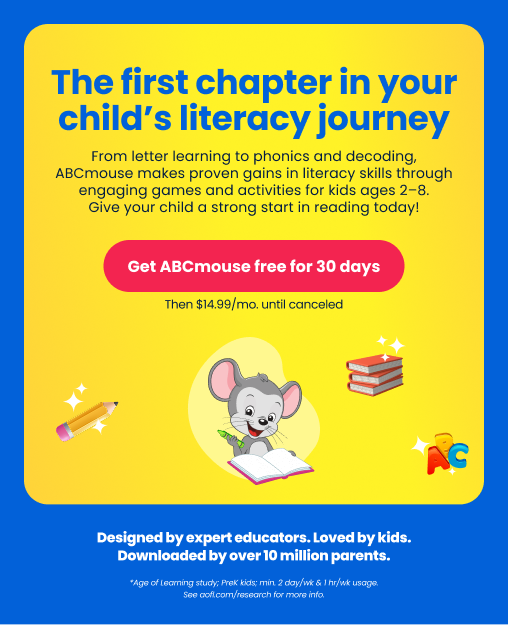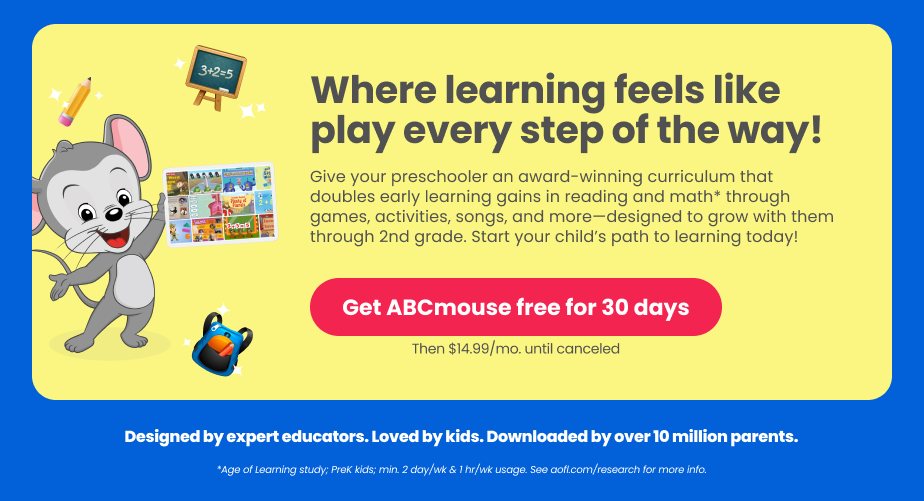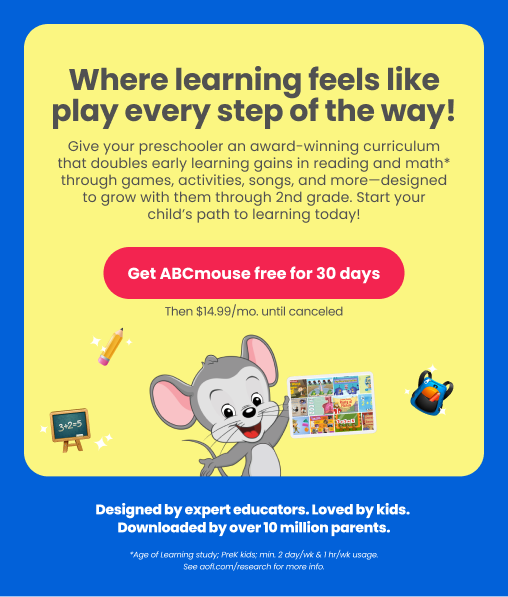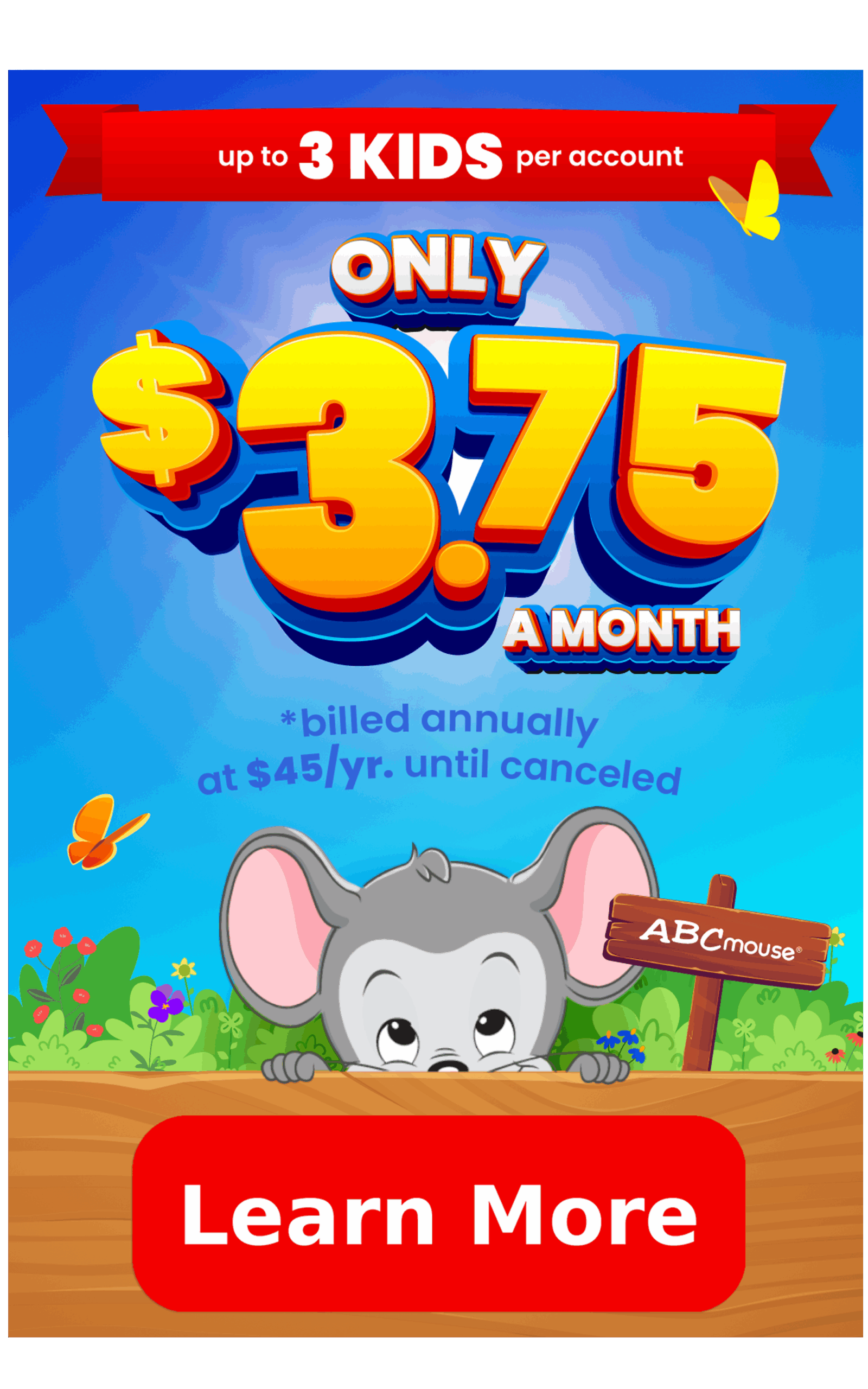
Preparing your Preschooler for Reading
Try these strategies to help get your preschooler ready to start reading.
Before your Pre-K student begins the exciting process of learning to read conventionally, they should engage in many different literacy experiences to build a strong understanding about how printed language works and to start building a positive association with reading.
There is so much your child is learning and absorbing that will prepare them to read words independently. As you engage in literacy experiences with your child, they are developing key understandings about printed language that will support their comprehension and word reading ability later on.
Singing songs and rhymes, listening to read-alouds, and having rich conversations about the world around them helps them to build the foundational literacy skills of a successful reader. Try using our list of Best Rhyming Books for Young Kids to help keep reading a fun and engaging activity.
The ABCmouse Preschool Reading Program provides is a great partner to the reading your child does at home or at school, offering structured, engaging activities that help young learners build early literacy skills, including letter recognition, phonics, and comprehension.
Research shows that ABCmouse doubles early learning gains in reading and math.*
*Age of Learning study; PreK kids; min. 2 day/wk & 1 hr/wk usage. See aofl.com/research for more info.
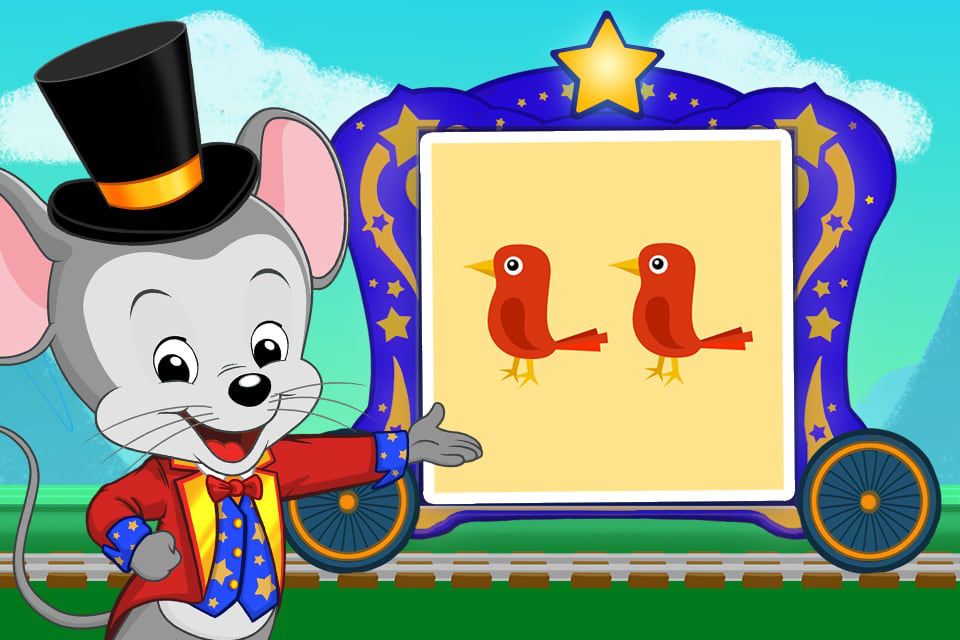
Reading Concepts for Preschoolers

Preschoolers are likely early in the process of learning to read, but there are many foundational skills you can build at this young age.
Here are just a few concepts to focus on:
- Letter sounds
- Answer questions about characters and events from a story
- Identifying upper- and lowercase letters
- Identify details from fiction and nonfiction
- Identify beginning, middle, and ending sounds
- Beginning sight words
3 Strategies to Support Your Preschooler
Here are 3 key understandings about words and print, along with strategies to support your child.
1. Words represent objects and ideas
Your child is learning that the printed markings they see in books, TV shows, signs, are called words and that they have meaning. These words represent objects and ideas and (spoken and printed) are used to communicate with others.
Very young children typically pay attention to adults and/or the pictures in a book to make meaning from the story. Preschoolers are beginning to recognize that meaning is also made from the printed words and represent spoken language.
Use the following strategies to help your preschooler develop this understanding:
Point to Print During Storytime
Read a story to your child.
While you read, draw attention to the words in the story by sweeping your finger underneath the words as you read them. For more insights on how this method benefits early literacy, check out The Power of Shared Reading.
Pause periodically to tell your child what a word says (e.g., This word says, “ball”).

Print Your Child’s Name
Label your child’s belongings with their name and point them out together.
Read books with “visible sounds”
Read books with print that is illustrated in a particularly noticeable way. For example, texts that feature “visible sounds” like neigh, boom, or woof!
Go on a “Word” Hunt
Look for print in the world around you. Your groceries, books, TV shows and movies, phone, written letters all contain print.
Point these out with your child and talk about what these words mean. Extend your discussion by talking about the purpose of the print. (e.g., a stop sign tells us something we need to do, the word “chocolate” tells us the flavor of the milk).

2. Words are made up of sounds
Preschoolers are learning that all of these spoken and written words are made up of individual sounds!
This understanding is key to supporting your child in building an awareness of different sounds and being able to isolate and read them in print.
You can use some of these activities to help your child build an awareness of sounds:
Read Books with Alliteration
Alliteration books offer a rich opportunity to attend to sounds at the beginning of a word.
For example, “Sally saw seven swans”. As you read books with alliteration, point out the repeated sound in the sentence and say the sound with your child.
Provide lots of support and encouragement in listening and producing alliterative words together.
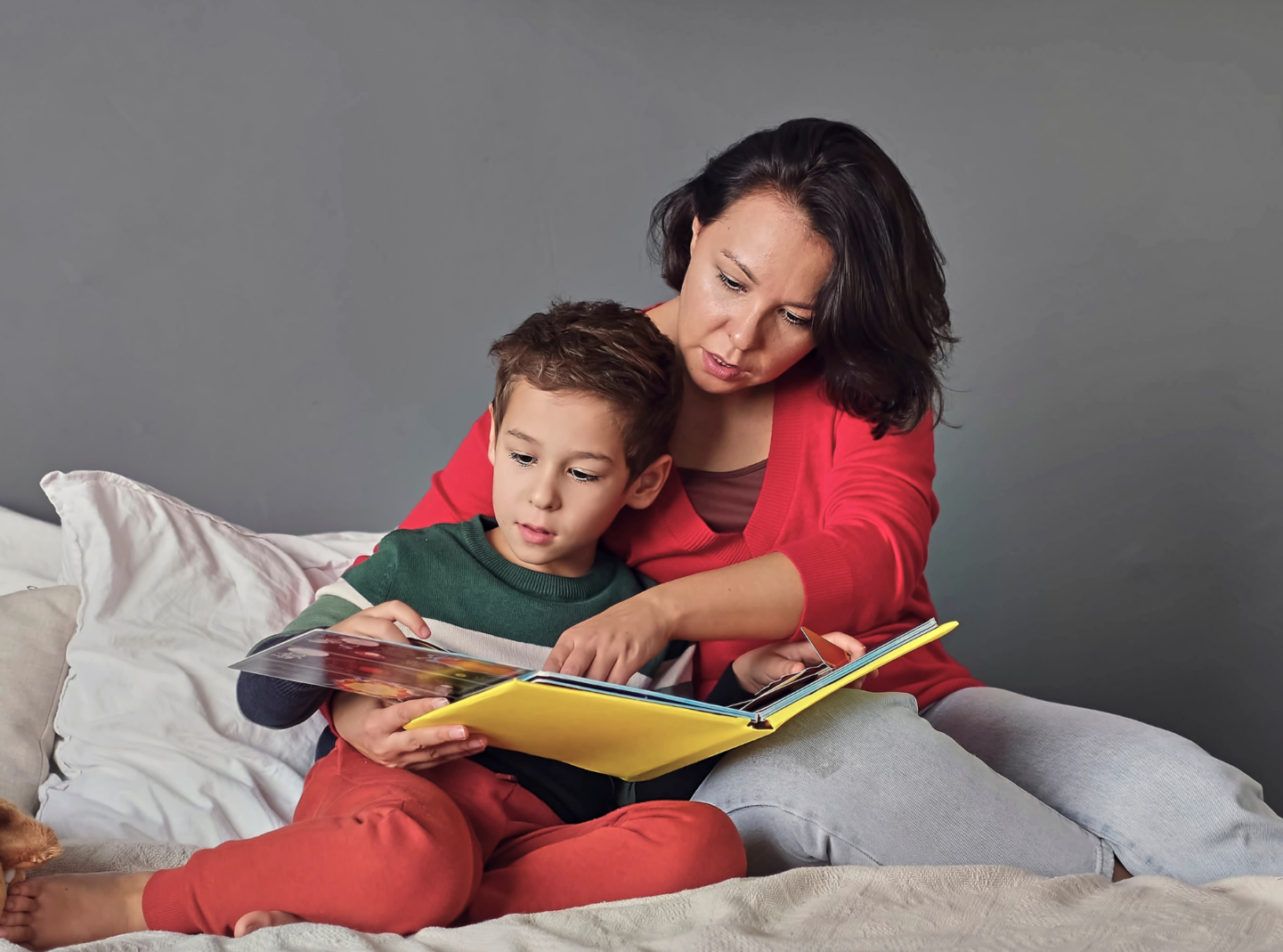
Sing Songs that play with Sound
You can help your child build awareness of middle and ending sounds of words by singing songs that include rhyme like “Down by the Bay.”
Check out ABCmouse’s YouTube channel for a lot of rhyming songs.
Extend the learning and fun by challenging your preschooler to think of some other rhymes on their own!
3. Sounds are represented by letters
In addition to learning that words are made up of smaller sounds, they also learn that letters represent those sounds.
For example, there are 2 sounds in the word “at”; the sound /a/ and the sound /t/ and they are represented by the letters “a” and “t” respectively. The understanding that those sounds are represented by the corresponding letters is known as the alphabetic principle.
Preschoolers are learning the names and the sounds for the 26 letters. This is important as they advance to reading words independently by blending the sounds of a word together. Find more tips on teaching letter sounds and phonics to children with our How to Teach Phonics post.
Prepare your child to be a confident letter-sound linker by using the following activities:
Read an Alphabet Book
An alphabet book provides an appropriate space for exploring the letters, their names, the sounds they make and enjoying different objects that begin with that letter.
Encourage your child to name each letter and make its sound along with you. For extra practice, try printing out our Letter Coloring Pages.

Play “I Spy”
Show your child a letter (e.g., letter “s”) and tell them the sound it makes. Then, with your child, look for different objects at home or outside that start with the letter “s”.
When you find an object, say its name and draw attention to the first sound. (e.g., ssstop, ssstore, sssoap). Remind your child of the letter name and its sound.
Try Digital Learning Apps
Playing on digital learning apps can be a supportive way to introduce and practice letter sounds.
Apps like ABCmouse have highly engaging activities like interactive games and songs that will help your child learn the letters and their sounds.
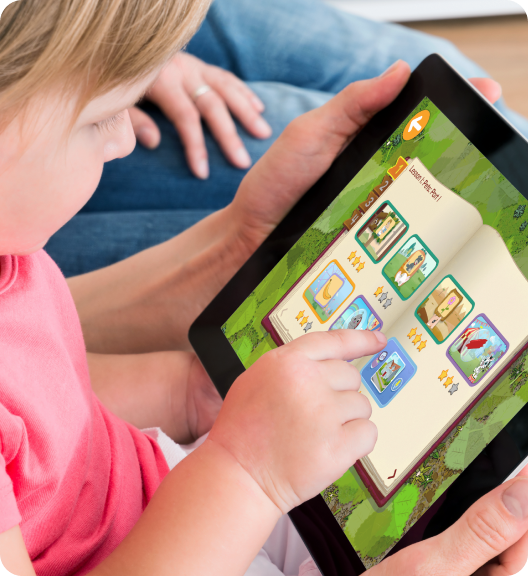
How To Help Your Preschooler With Reading At Home
- Encourage a Love of Reading
Since reading plays a vital role in a child’s overall success, it’s good to remember the small things you can do to help kids love it.
- Read Anything and Everything
The cereal box, signs at stores, billboards, instructions—regularly pointing out all the different things you can read helps show kids why it’s an important part of our daily lives. Even pointing out familiar letters to your child helps reaffirm the beginning reading skills they’re developing.
- Introduce Kids to a Variety of Books
You don’t have to buy a lot of books to have access to them. You can often find plenty of books between public libraries and Little Free Libraries. You could also try a book exchange with friends. By exposing kids to a variety of books, they’re bound to find something that catches their interest and helps them develop an even greater love of reading.
- Get a Library Card
If you want to see an empowered kid, give them access to their library card. This is a great way to give kids ownership of their reading journey. Next time you’re at the library, let your child scan their library card at checkout or hand it over to the librarian. Keeping them involved in the process helps them enjoy it even more.
- Let Them See You Reading
When kids see adults reading, they also see how others value it. Whether you’re reading books or reading signs and billboards while running errands, it’s good to model all the possibilities out there.
- Make Reading Special
Regularly setting aside time for reading and making it an enjoyable experience can make a big difference for kids. It might be tempting to rush through or cut the reading time short, but if you can make it special and stretch that time out, it’ll go a long way.
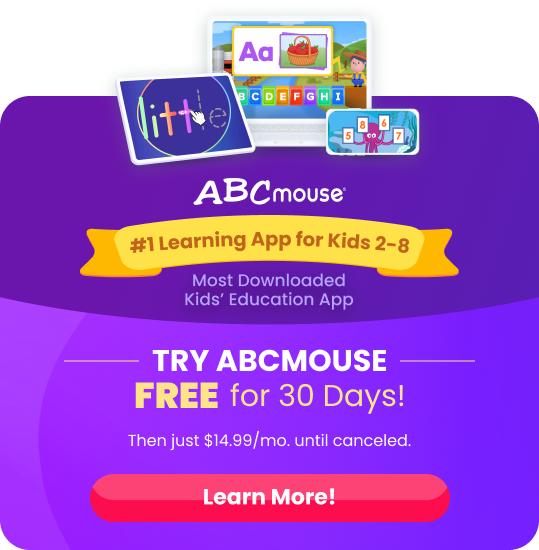
Additional Resources
ABCmouse has preschool worksheets, activities, and games designed by early education experts to help your child keep learning.
Preschool Reading Worksheets
Explore the ABCmouse printable reading worksheets for your preschooler to practice with at home.
Browse →
Preschool Math Activities
Add some hands-on fun to learning about math with our selection of math activities for preschoolers.
Browse →
Educational Games for Preschoolers
Find tons of online games to help your preschooler keep growing their math and literacy skills.
Browse →
These resources offer a blend of interactive games and educational content that can make learning addition a fun and rewarding experience.
ABCmouse’s expert advice review process:
Our team of ABCmouse Curriculum Experts, made up of talented professionals in early childhood education and development, take a close look at educational content and learning claims. They put in the effort to make sure our information is accurate and current. We have a certified educator or another respected authority review the content, matching their expertise with the topic at hand. They’ll make sure the content is thorough and follows the latest research and educational guidelines. If they think we can make things even better, they’ll chat with our editorial team, and we’ll make those improvements right away. Only after a reviewer gives their thumbs-up does a piece of content get the official stamp of approval in the byline.


